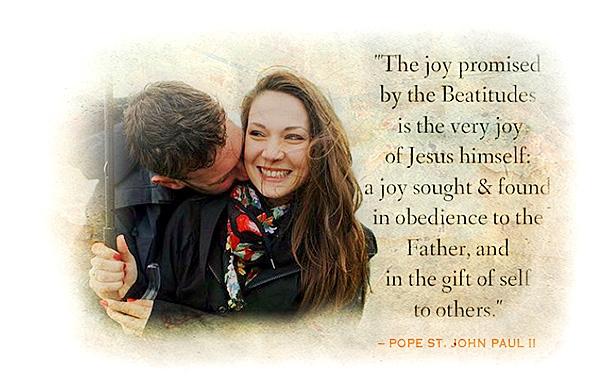

Things That Catholics Need To Know
 “What really matters in life is that we are loved by Christ and that we love Him in return. In
“What really matters in life is that we are loved by Christ and that we love Him in return. In
comparison to the love of Jesus, everything else is secondary. And, without the love of Jesus,
everything is useless.” – Pope Saint John Paul II
The most extraordinary and profound truth is that God’s love for you is beyond anything
that you can imagine. As a Catholic Christian, it is essential that you accept and understand this
wonderful truth. God loves you regardless of your past or your sins. Jesus died to save all of us
from sin and spiritual death; He loves you so very much that if you were the only person in need
of salvation, He would lay down His life just for you. “No one has greater love than this, to lay
down one’s life for one’s friends” (John 15:13).
Without accepting God’s invitation to have a deep and loving relationship with Him,
nothing else that you do will make much sense. First and foremost, you are loved, chosen, and
called into communion with the Father, the Son, and the Holy Spirit. All that you become
depends upon your willingness to accept God’s grace, to enter into a love relationship with Him,
and to be transformed into a more faith filled, knowledgeable, cherished, intimate, and loving
member of the body of Christ, the Church.
THE GREAT COMMANDMENT
The Ten Commandments are fulfilled in Jesus’ Great Commandment: “You shall love…God with
all your heart, with all your soul, with all your mind, and with all your strength….You shall love
your neighbor as yourself.” (Mark 12:30-31)
THE NEW COMMANDMENT
Before his death on the cross, Jesus gave his disciples a new commandment: “Love one
another. As I have loved you, so you also should love one another” (John 13:34).

THE HOLY EUCHARIST – (HOLY COMMUNION)
1) The bread and wine of the Eucharist becomes the true transubstantiated body and blood
of Christ. It is not a mere symbol.
2) The Eucharist is the body, blood, soul, and divinity of Christ Jesus.
3) The reception of Holy Communion is the center of Catholic Faith.
4) Communion is by definition to be in union with God and with His Church, to be one in
faith.
5) To receive Communion, a person must be a practicing Catholic in the state of grace.
6) Only an ordained Catholic priest, in the person of Jesus Christ, the High Priest, can
transform bread and wine into the body and blood of Christ.
THE SIX TRUTHS
To be known and believed by all.
1) There is one God, who created, who preserves and governs all things.
2) God is a just Judge, who rewards the good and punishes the wicked.
3) In God there are three Persons: God the Father, God the Son, and God the Holy Spirit.
4) The Second Person, Jesus Christ, became man and died on the cross to save us.
5) The soul of man is immortal.
6) Grace is necessary for salvation.
THE TEN COMMANDMENTS OF GOD
1) I am the Lord thy God, who brought you out of the land of Egypt, out of the house of
bondage. Thou shalt not have strange gods before Me. Thou shalt not make to yourself a
graven thing, not the likeness of anything that is in heaven above, or in the earth beneath, nor of
those things that are in the waters under the earth. Thou shalt not adore them nor serve them.
2) Thou shalt not take the name of the Lord thy God in vain.
3) Remember that thou keep holy the Sabbath – day.
4) Honor thy father and thy mother.
5) Thou shalt not kill.
6) Thou shalt not commit adultery.
7) Thou shalt not steal.
8) Thou shalt not bear false witness against thy neighbor.
9) Thou shalt not covet thy neighbor’s wife.
10) Thou shalt not covet thy neighbor’s goods.

THE EIGHT BEATITUDES
1. Blessed are the poor in spirit, for theirs is the kingdom of heaven.
2. Blessed are the meek, for they shall possess the land.
3. Blessed are they that mourn, for they shall be comforted.
4. Blessed are they that hunger and thirst after justice, for they shall be filled.
5. Blessed are the merciful, for they shall obtain mercy.
6. Blessed are the clean of heart, for they shall see God.
7. Blessed are the peace-makers, for they shall be called the children of God.
8. Blessed are they that suffer persecution for justice’ sake, for theirs is the kingdom of heaven.
THE SIX PRECEPTS OF THE CHURCH
1) To attend Mass on Sundays and Holy days of obligation.
2) To fast and abstain on the days appointed.
3) To confess at least once a year.
4) To receive the Most Blessed Sacrament during the Easter time.
5) To contribute to the support of our pastors.
6) Matrimony is a Sacrament between one Man and one Woman. It provides grace to the couple and the Church helps prepare couples for the Sacrament. Please see Sacraments and Matrimony on our website.
THE SIX HOLY DAYS OF OBLIGATION
1) *January 1 – Mary, Mother of God.
2) Ascension – 40 days after Easter
3) *August 15 – The Assumption of the Blessed Virgin Mary.
4) *November 1 – The feast of All-Saints.
5) December 8 – The Immaculate Conception of the Blessed Virgin.
6) December 25 – Christmas
*If on a Monday or Saturday – No Obligation in the USA
THE SEVEN SACRAMENTS
1) Baptism
2) Confirmation
3) Holy Eucharist
4) Penance
5) Anointing of the Sick
6) Holy Order.
THE FOUR CARDINAL VIRTUES
Prudence, Justice, Fortitude, Temperance
THE THREE EMINENT GOOD WORKS or SPIRITUAL PRACTICES
Prayer, Fasting, Alms-giving
THE THREE EVANGELICAL COUNSELS. (Vows taken by most religious in order to more
perfectly serve the Church)
Voluntary Poverty, Perpetual Chastity, Obedience
THE CHIEF CORPORAL WORKS OF MERCY
1)To feed the hungry
2) To give drink to the thirsty
3) To clothe the naked
4) To ransom the captive
5) To harbor the harborless
6) To visit the sick
7) To bury the dead
THE CHIEF SPIRITUAL WORKS OF MERCY
1) To admonish the sinners
2) To instruct the ignorant
3)To counsel the doubtful
4) To comfort the sorrowful
5) To bear wrongs patiently
6) To forgive injuries
7) To pray for the living and the dead

THE SEVEN GIFTS OF THE HOLY SPIRIT
Wisdom, Understanding, Counsel, Fortitude, Knowledge, Piety, Fear of the Lord
THE TWELVE FRUITS OF THE HOLY SPIRIT
Charity, Joy, Peace, Patience, benignity, Goodness, Long-Suffering, Mildness, Faith, Modesty,
Continence, Chastity
Love the Fight Not the Fall: Sometimes we may feel overwhelmed. Slowly but surely, we
may tire of our defects and their effects. The constant, on-going battle to follow Christ may
slowly wear us down. The path to perfection in the virtues is surely full of rewards, but it has its
share of wear-and-tear. But it does not matter if we fall a thousand times, as long as we love the
fight and not the fall. It therefore makes no sense to despair, especially when we fight with
Christ on our side. The effort of a prolonged battle can please Christ more than an easy and
comfortable victory. Christ reminds us: He will suffer greatly, be rejected and killed, and
everyone who wants to be his disciple must take up his cross and follow him.
– Father Paul Hubert, LC
From The Catechism of the Catholic Church
1854 Sins are rightly evaluated according to their gravity. The distinction between mortal
and venial sin, already evident in Scripture,129 became part of the tradition of the
Church. It is corroborated by human experience.
1855 Mortal sin destroys charity in the heart of man by a grave violation of God’s law; it
turns man away from God, who is his ultimate end and his beatitude, by preferring an
inferior good to him. Venial sin allows charity to subsist, even though it offends and
wounds it.
1856 Mortal sin, by attacking the vital principle within us – that is, charity – necessitates anew initiative of God’s mercy and a conversion of heart which is normally accomplished
within the setting of the sacrament of reconciliation.
1857 For a sin to be mortal, three conditions must together be met: “Mortal sin is sin
whose object is grave matter and which is also committed with full knowledge and
deliberate consent.”131
BAPTISMAL VOWS
“I renounce Satan. I renounce all his works. I renounce all his pomps.”
By these words, we renounce all suggestions and snares of the evil one, all deliberate sins, all
the follies and vanities of worldly-minded men and women.
THE SEVEN CAPITAL SINS AND THEIR OPPOSING VIRTUES
1) Pride – Humility
2) Covetousness – Liberality
3) Lust – Chastity
4) Anger – Meekness
5) Gluttony – Temperance
6) Envy – Brotherly Love
7) Sloth – Diligence
THE FOUR CONDITIONS FOR FORGIVENESS OF SIN
On the part of the Penitent: Contrition, Confession, Satisfaction.
On the part of the Confessor: Absolution
THE SIX SINS AGAINST THE HOLY SPIRIT
Presumption of God’s mercy, Despair, Resisting the known truth,
Envy at another’s spiritual good, Obstinacy in sin, Final Impenitence
THE NINE WAYS OF BEING AN ACCESSORY TO ANOTHER’S SINS
1) By Counsel
2) By Command
3) By Consent
4) By Provocation
5) By Praise or Flattery
6) By Concealment
7) By Taking Part in the sin
8) By Silence
9) By Defending the evil
